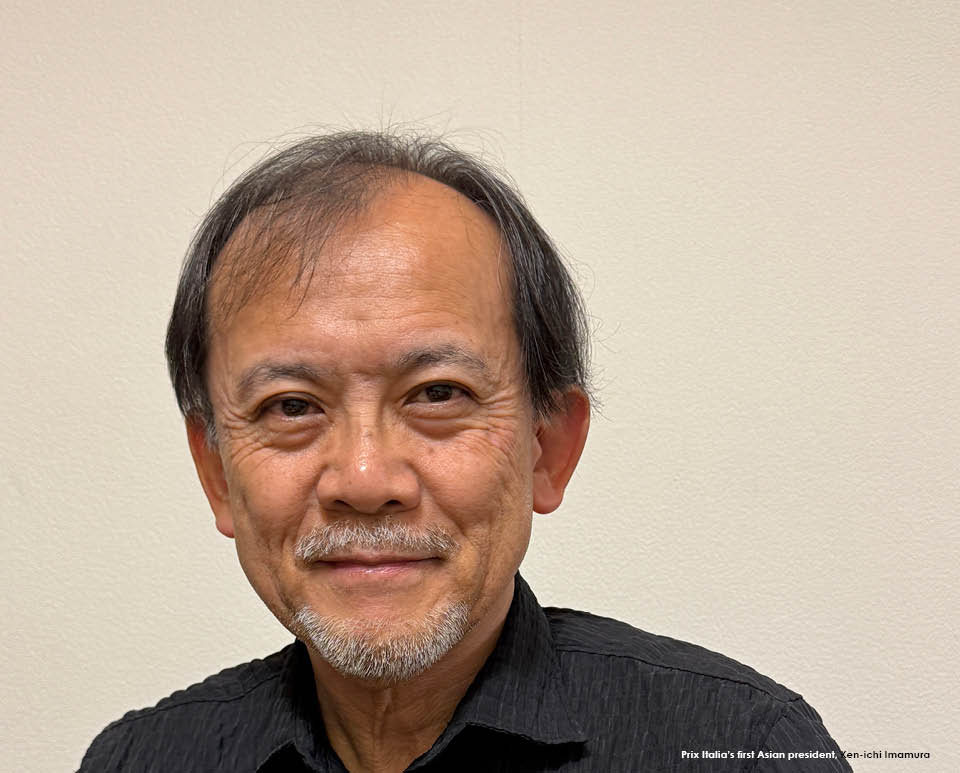
Japan’s Ken-ichi Imamura leads a leap forward for Asia’s public broadcasters and documentary filmmakers. As the first Prix Italia president in the festival’s 77-year history, the veteran NHK producer and co-founder of Tokyo Docs not only caps a four-decade career in the factual space, he also extends his commitment to international collaboration, cross-cultural storytelling and talent development.
Imamura also takes on the Prix Italia 2025 role with a long-held and unwavering belief in public service media. “I see this role as an opportunity to foster meaningful dialogue, support bold creativity, and champion the values that unite us through audiovisual expression,” he tells ContentAsia.
He’s particularly keen on bringing indie filmmakers into the fold. “One of my key aspirations is to encourage more collaboration across broadcasters beyond regional boundaries, and to further promote international co-productions. In particular, I hope to strengthen the connection between broadcasters and independent filmmakers, where collaboration is still often limited but holds tremendous potential.”
Imamura says the biggest challenge facing documentary producers at the moment is the weakening of public broadcasters around the world and securing funding for new projects.
“Younger audiences are turning away from public television, and as a result, production budgets are shrinking year by year. Streaming platforms like Netflix are also not investing much in documentaries.
“Moreover, in Asia, there are very few funds available to support the development of new projects. Many young filmmakers are sacrificing their time and money just to keep going,” he says, adding that this makes it even more essential “for those of us in the documentary industry to stand together, support one another, and create opportunities for emerging filmmakers so that their voices and stories can reach audiences around the world”.
The most significant current trends are the changing profile of documentary filmmakers and factual entertainment consumption.
“About 10 years ago, independent filmmakers around t...
Japan’s Ken-ichi Imamura leads a leap forward for Asia’s public broadcasters and documentary filmmakers. As the first Prix Italia president in the festival’s 77-year history, the veteran NHK producer and co-founder of Tokyo Docs not only caps a four-decade career in the factual space, he also extends his commitment to international collaboration, cross-cultural storytelling and talent development.
Imamura also takes on the Prix Italia 2025 role with a long-held and unwavering belief in public service media. “I see this role as an opportunity to foster meaningful dialogue, support bold creativity, and champion the values that unite us through audiovisual expression,” he tells ContentAsia.
He’s particularly keen on bringing indie filmmakers into the fold. “One of my key aspirations is to encourage more collaboration across broadcasters beyond regional boundaries, and to further promote international co-productions. In particular, I hope to strengthen the connection between broadcasters and independent filmmakers, where collaboration is still often limited but holds tremendous potential.”
Imamura says the biggest challenge facing documentary producers at the moment is the weakening of public broadcasters around the world and securing funding for new projects.
“Younger audiences are turning away from public television, and as a result, production budgets are shrinking year by year. Streaming platforms like Netflix are also not investing much in documentaries.
“Moreover, in Asia, there are very few funds available to support the development of new projects. Many young filmmakers are sacrificing their time and money just to keep going,” he says, adding that this makes it even more essential “for those of us in the documentary industry to stand together, support one another, and create opportunities for emerging filmmakers so that their voices and stories can reach audiences around the world”.
The most significant current trends are the changing profile of documentary filmmakers and factual entertainment consumption.
“About 10 years ago, independent filmmakers around the world would complete a feature-length documentary and then create a shorter TV version. Since NHK did not typically broadcast feature-length documentaries, a TV-hour version was crucial.
“Today, feature documentaries are becoming more personal and artistic, driven by the individual vision of the director. On the other hand, TV documentaries are expected to be well-balanced, informative, accessible, and easy to understand.
“As a result, many of today’s creative feature-length films don’t easily translate into TV versions. Some directors are not interested in making TV adaptations, or simply don’t have the skills and funding to do so. Especially among independent filmmakers, I feel that the worlds of feature-length and television documentaries are gradually drifting apart.”
His advice to young filmmakers is to look outward. “Many young documentary filmmakers today tend to focus on personal themes – stories about themselves, their families or close friends. While these are certainly meaningful topics, I would also encourage them to look outward.”
“Our society is facing numerous large-scale issues: aging populations, deepening poverty, the isolation of youth, and the global decline of democracy. I hope young creators will take on these pressing themes.”
He lists examples such as German-Japanese project, Johatsu – Into the Thin Air, about people in Japan who disappear into thin air, and Thai documentary Breaking the Cycle, which follows young Thai politicians trying to reform their country.
“What’s important is to find compelling protagonists and portray these issues through the lens of their lived experiences.”
“I find it deeply encouraging and exciting to see this new wave of committed young documentary makers emerging,” Imamura says.
Looking back on a career that started when he joined Japanese public broadcaster NHK in 1983, Imamura says documentary co-production, Planet of Snail (2011), is among his project highlights.
He supported Planet of Snail (2011) for NHK and was among his first international co-production projects. Directed by Korea’s Yi Seung-jun, the film is about a deaf-blind poet and his wife, who has a spinal disability.
Critics’ consensus, according to Rotten Tomatoes, is that the film “is there to reinvigorate your heart in this ageless story of enduring love”.
NHK was the only co-production partner from Asia and the film went on to be the first Asian documentary to win the Best Feature-Length Documentary award at the 25th International Documentary Film Festival Amsterdam (IDFA).
“I feel proud that I was able to recognise its potential at a time when no one else had and that our support helped the director realise the project. It was a rewarding experience that showed me the true value of international co-production,” Imamura says.
Another highlight is director Aboozar Amini’s Kabul, City in the Wind (2018), a co-production between the Netherlands, Germany, Japan and Afghanistan. The film documents daily life in a war-torn city through the experiences of residents like Abas the bus driver always on the look out for terrorists, and teen brothers forced to grow up fast when their father flees to Iran for safety.
“I still vividly remember sitting in a café in Amsterdam and talking with director Aboozar Amini for nearly an hour – about two years before the film was completed. Aboozar is a young Afghan filmmaker who studied documentary production in Amsterdam. At the time, the project had very little funding, but his passion and clear vision moved me. NHK became the first broadcaster to join as a partner, and I was the co-producer. The film was distributed globally and went on to win multiple awards.
“I’m proud to have believed in a young director’s potential and to have contributed to his success,” Imamura says.
He also pinpoints Digital Stadium, his first regular programme as a producer at NHK, which explored the potential of digital expression. The show launched in 2000 and ran for 10 years, supported by the Asia-Pacific Broadcasting Union (ABU).
Digital Stadium paved the way for Imamura’s involvement in Anime Manga Explosion, which explores the frontlines of anime and manga, on international service NHK World – Japan. He is currently executive producer of the 30-minute documentary.
An edited version of this story appeared in ContentAsia's eNewsletter of 19 May 2025































